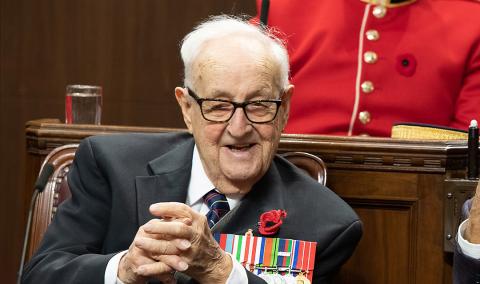
After a few months of basic training in Cornwall, Ontario, Lalonde learned that he would be deploying to England at the end of July.
The timing was far from ideal: Lalonde’s wedding was scheduled for August and his fiancée was determined that they would marry as planned. Luckily, Lalonde managed to delay his departure, and the ceremony took place as planned on 5 August. Two weeks later, he was on a train to Windsor, Nova Scotia, alongside 40 to 50 other soldiers from across the country. After spending a few days in the Maritime province, Lalonde and his fellow servicemen embarked on the Queen Elizabeth I for the long Atlantic crossing destined to Aldershot, England.
After two weeks in Aldershot, Lalonde was assigned to the number 5 Ordnance Depot in Chilworth. That position became redundant after the Normandy Landings, so he returned to Aldershot. He was then selected for a deployment to Italy, but this was delayed until he could receive all of his inoculations. It wasn’t until August 1944 that Lalonde finally arrived, but even then, making landfall on the Italian coast wasn’t easy. “We tried to disembark at the port of Naples but it had been totally destroyed by the Germans, so we had to use small boats to get ashore.”
“I traded my typewriter for a .303 rifle.”
In Avellino, Italy, Lalonde was assigned to the “C” Company of the Royal 22e Régiment. As a Francophone, he was happy to join a French regiment, though he did not disclose that he was a clerk typist. “I traded my typewriter for a .303 rifle,” he said. Lalonde’s first day with the Van Doos was not easy. “We were welcomed with a barrage of German mortars called ‘Moaning Minnies’ and I realized then and there that giving up my typewriter may have been a big mistake.”
Lalonde remembers when the entire 22e Régiment met in Piangipane, Italy, for Christmas mass followed by a Christmas feast. To the soldiers’ delight, the “réveillon” included a Molson beer. He also recalls two visits to Rome where the Regiment met the Pope. Lalonde also reminisces about spending his evenings in a local bistro and learning Italian on the fly to speak with his new Italian friends.

October 1945
Eventually, the 22e Régiment was transferred to Port Giorgio on the Adriatic sea, where Lalonde was finally able to shower. “I hadn’t showered since leaving Avellino. There was no way. We were washing ourselves as best as we could. In Port Giorgio, they took away our old clothes and gave us new ones.” His regiment then moved on to France, Belgium, and eventually into the Black Forest, in Germany, to assist in the Liberation of the Netherlands.
“They come back constantly, the horrors we lived through. I am 98 years old today and I still suffer from them.”
While overseas, Lalonde experienced many life-altering moments. He learned by mail of his mother’s passing, almost six months after her death. He also found out about the birth of his daughter months after she had arrived. After witnessing a traumatic event on the battlefield, Lalonde’s Major told him “Roland, put this in the back of your mind and forget it,” but to this day Lalonde still experiences PTSD. “You can’t forget those things. They come back constantly, the horrors we lived through. I am 98 years old today and I still suffer from them.”
Upon his return to Canada, Lalonde was taken to the Plains of Abraham in Quebec City where he was overwhelmed to see the number of people that had gathered to celebrate the soldiers’ return and the end of the war. “We paraded through Québec city. You can’t explain it, the people that were there.” After picking up a flag, he participated in a victory parade through the streets. A group of soldiers then travelled to Montreal where they were treated to a celebratory breakfast. When he finally arrived in Ottawa, Lalonde was greeted by more than 50 family members and friends who carried him triumphantly on their shoulders and continued their celebrations for more than a week. He was finally home!

Mr. Lalonde reads the Act of Remembrance at the 2019 Annual Veterans’ Week Senate Ceremony Of Remembrance.
Lalonde also continued serving after he returned from Europe. He completed two five-year contracts in the Canadian Army with the Governor General’s Foot Guards. Upon release from the Canadian Forces, he was awarded the Canadian Forces’ Decoration as a Warrant Officer.
Roland Lalonde is now 98 years old. He lives in Ottawa and still proudly represents Second World War Veterans at numerous remembrance events and speaking engagements. He’s also a member with the Association du Royal 22e.
In honour of the 75th anniversary of the end of the Second World War, Roland Lalonde is this week’s Face of Freedom. You can also hear his story first hand by listening to his episode of our Faces of Freedom podcast (In French only).